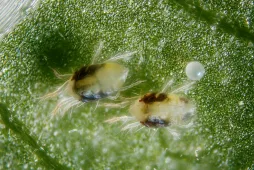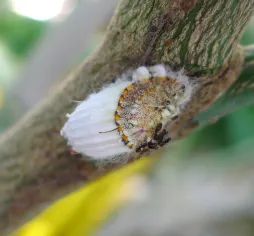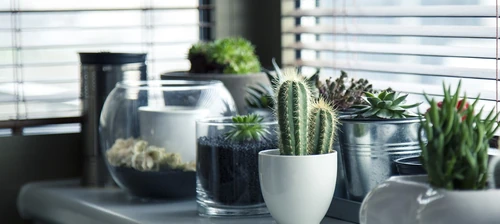Alocasia Frydek variegata, a velvety, variegated alocasia
In the small world of plants, Alocasia 'Frydek' variegata is undoubtedly even more sought-after than its illustrious ancestors, alocasia Frydek and alocasia 'Green Velvet. And understandably so! Who can resist its velvety, variegated leaves?
How to recognize Alocasia 'Frydek' variegata?
A perennial with an upright, compact habit, Alocasia 'Frydek' variegata reaches a metre in height and a 60-centimetre spread.
Thick rhizomes give rise to a short, fleshy stem. It is often concealed by the long petioles that support the foliage.
The sagittate, velvety leaves are 30 to 50 cm long. The leaf blade is a luminous, deep green with irregular white mottling.
Flowers are rare indoors, as with alocasia 'Batik Variegata. They consist of a spathe surrounding a spadix.
Alocasia 'Frydek' variegata is toxic to humans and animals. The entire plant contains calcium oxalate crystals. When ingested, they cause digestive disorders. They can also cause skin or mucous membrane irritation on contact.
Our maintenance tips
Alocasia 'Frydek Variegata are not plants to be placed in everyone's hands. They need light, rich soil, a little knowledge and a lot of attention.
Watering
Keep the soil in your Alocasia 'Frydek Variegata' always fresh. When the substrate is one to two centimeters dry, you can water.
Use room-temperature, non-calcareous water. What's best? Recovered rainwater. If you don't have any, you can use filtered water. You can also use tap water, provided you let it stand for a while.
After watering, empty the water stagnating at the bottom of the dish. It may rot the roots.
Spray
If the air in your home is dry, spray the leaves of your plant with non-calcareous water at room temperature.
Repotting
In spring, transfer your Alocasia micholitziana 'Frydek Variegata' to a larger pot, so that it can continue to grow.
Choose a pierced pot slightly larger than the previous one. It's best to opt for a clay model: this material promotes even drying of the soil.
Line the bottom with a bed of gravel or clay balls. Add a layer of potting soil with perlite or sand. For example, you can mix potting soil for green plants with sand. Place your subject in the center and fill in with substrate to within a couple of centimeters of the edge. Tamp down and water for the first time to encourage rooting.
Fertilization
You can stimulate the development of your plant during its growth phase, in spring and summer, with fertilizer.
Apply liquid green plant fertilizer diluted with water.
Cleaning
The leaves of your Alocasia 'Frydek Variegata' accumulate dust. It interferes with photosynthesis and encourages the appearance of parasites. Clean them with a clean, damp sponge.
Remember that alocasia 'Frydek Variegata is toxic. Wear gloves when dusting.
Cutting
Cutting is carried out during the strong growth phase, generally in spring and early summer.
Using your hands or a clean, sharp tool, separate one of the shoots that has formed at the base of the plant. Choose a young shoot with roots.
Prepare buckets with potting soil similar to that used for adult plants. Translucent pots are best. You'll be able to monitor root growth.
Place the bulbils on the surface, flat side down and pointed side up. Water and then place your bulbils in a greenhouse or transparent crate.
Diseases / Threats
Information
| Family | Araceae - Araceae |
| Type | Alocasia - Alocasia |
| Species | Alocasia micholitziana - Alocasia micholitziana |
| Lifecycle | Perennial |
| Foliage | Evergreen |
| Exposure | |
| Substrat | |
| Planting methods |
In pots In tubs |
| Categories | |
| Tags |
Fritillary Soiffarde Toxic |
| Origin |
Southeast Asia |
| Hardiness (USDA) | 11a |
| Leaf color |
|
Discover plants from the same family
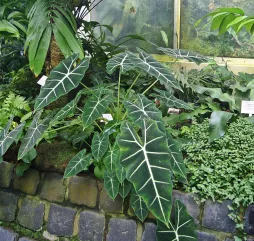
Alocasia 'Green Velvet
Discover
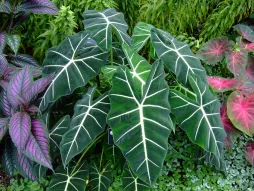
Alocasia Frydek
Discover
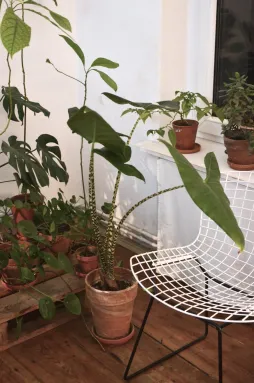
Alocasia zebrina
Discover
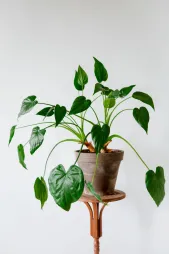
Alocasia cucullata
Discover














